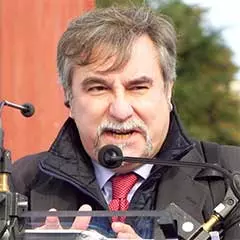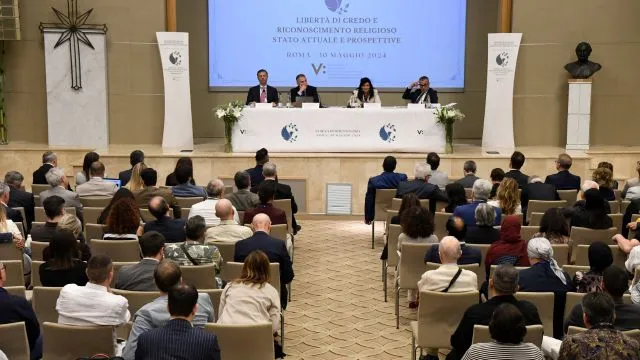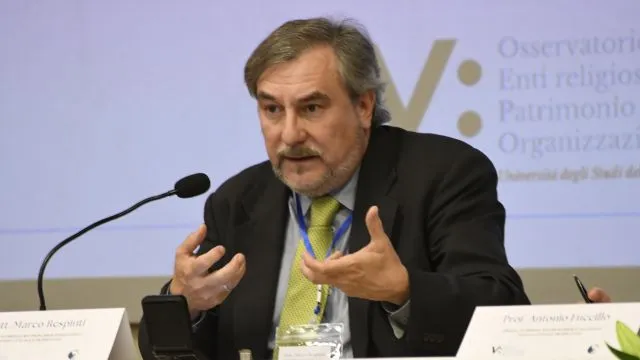
On 30 May, Marco Respinti, member of FOB's Advisory Council, took part as a speaker in the international conference “Freedom of Belief and Religious Recognition: Current State and Perspectives”, organized by the Church of Scientology of Rome in collaboration with the Observatory on Religious Entities, Ecclesiastical Heritage and Non-Profit Organizations of Campania University ‘Luigi Vanvitelli’ of Naples. Below is Marco Respinti’s account published in Bitter Winter.
Should States Control Religious Liberty? A Conference in Rome
An international gathering of scholars hosted by the Church of Scientology in Rome raised questions of great importance for all faiths.
by Marco Respinti — In totalitarian and authoritarian countries, religious groups and individual believers literally struggle for their lives, which is the indispensable precondition to enjoy the first political human right, i.e., religious liberty. In democratic countries, religious liberty suffers indirect obstacles and confronts subtler enemies. Even if situations differ from country to country, and from time to time, the barriers to the full enjoyment of religious freedom in places where liberty should be the normal rule include a series of limitations, some more restrictive than others, that make difficult for believers to publicly live their faith.
It is often a practical more than a theoretical problem, but this does not mean that, first, religious liberty suffers no theoretical problems at all in democratic countries and, second, that theory is unimportant. One essential feature of religions is in fact the free possibility for their adherents to live their faith in public and in an organized way.
To discuss this topic, through a careful scrutiny of the present situation and perspectives for future, the Church of Scientology organized a conference in Rome on May 30, 2024, in collaboration with the Observatory of Religious Entities, Ecclesiastical Patrimony, and Non-Profit Organizations of the University of Campania “Luigi Vanvitelli” from Naples, Italy.

A view of the conference in Rome’s Church of Scientology
Three main reasons made the conference an important international event. First, the venue. The conference was hosted by the Church of Scientology in its headquarters in Rome, in itself not a minor achievement. It is always difficult to convene a scholarly conference in a non-neutral venue. It is even more difficult if that venue is the home of what many still perceive, as sadly as falsely, as a “cult” such as Scientology. This goes also to the credit of the academic partners of the conference and their intellectual integrity.
A second reason, still tied to the venue, is the building itself where the Church of Scientology has its headquarters in a city sometimes referred to as “the capital of the world” and the center of Christendom, Rome. It is a modern and beautiful (as well as large and well-equipped) edifice that was built in a monastery’s shape by the Congregation of Christian Brothers, a lay male religious congregation of pontifical right established in Ireland in 1802, popularly known as the “Christian Brothers of Ireland.” A number of controversial scandals hit the Congregation in the late 20th century, drastically reducing its numbers and vocations, until in 1997 its Generalate in Rome was closed. The Church of Scientology acquired the building later, and in 2009 inaugurated it as its place of worship after a nice and conservative adaption of its space, including the chapel. This is a meaningful development documenting the evolution of religious pluralism in the heart of Europe, in Italy.
A third reason is the high academic quality of the international speakers. In the morning, the first panel, moderated by Alfonso Celotto, Professor of Constitutional Law at the University of Roma Tre, hosted Senator Lorena Rios Cuéllar, former Director of Religious Affairs of Colombia; Professor José Daniel Pelayo Olmedo, General Vice Director for Religious Liberty in Spain; and Dr. Gary Vachicouras, Coordinator for Academic and Administrative Affairs at the Post-Graduate Institute of Orthodox Theology in Chambésy/Geneva, Switzerland. In the afternoon, Professor Antonio Fuccillo, who teaches Ecclesiastical Law at the University of Campania “Luigi Vanvitelli”, moderated two subsequent panels. The first welcomed speeches and communications by American Constitutional Law expert Austin Hepworth, Professor Juan Ferreiro Galguera of the University of Oviedo in Spain, and Professor Vincent Berger, a former judge at the European Court of Human Rights. In the second panel, articulated in two roundtables, several speakers focused on the Italian situation: Professor Maria D’Arienzo of the “Federico II” University in Naples, Professor Gianfranco Macrì of the University of Salerno, Dr. Nader Akkad, advisor for Religious Affair of the Great Mosque of Rome, and the judicial advisor of the Romanian Orthodox Diocese, Mother Anastasia. In my capacity as Director-in-Charge of “Bitter Winter” I also took the floor, discussing religious liberty and media as its friends or foes.

Marco Respinti speaking at the conference
From different angles and perspectives, all the panelists described the present state of affairs regarding religious liberty in a number of situations and offered suggestions on how to improve it. At the end of the day, one basic question emerged from the conference. Is state recognition at different levels, including in the Italian form of the “Intese” (“concordats” with a small “c,” as the Italian Constitution reserves the name of Concordat to the one with the Roman Catholic Church), the best solution to the problem of religious liberty in democratic countries? Is religious liberty all about a state signing as many agreements as there are religious groups active within its boundaries?
While the last word on this subject is yet to come, the conference was a clear moment of comparison and reasoning. The journalist trained in philosophy that lives in me went home with another question. Is there a risk that reducing the debate on religious liberty to different forms of state recognition, including the Italian “Intese,” may implicitly or inadvertently confer to the state the power to grant to religious groups the right to exist? In practice, states do have such power in different countries. The question is whether giving such an authority to the state is morally and philosophically correct.
Perhaps, a state should just watch over the compliance of its citizens with the laws (assuming the laws are just), regardless of their religious persuasion, and leave religious groups alone to live and self-regulate their lives, The state is not the source of religious liberty, although it should acknowledge and protect it. It may be a good topic for another conference.
Source: Bitter Winter





